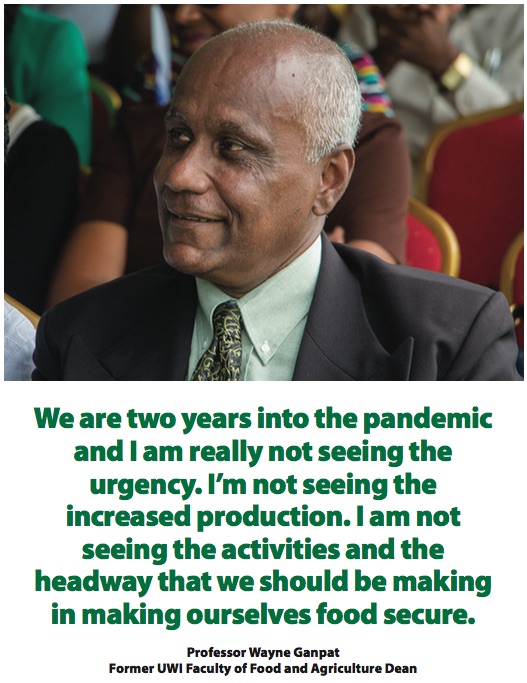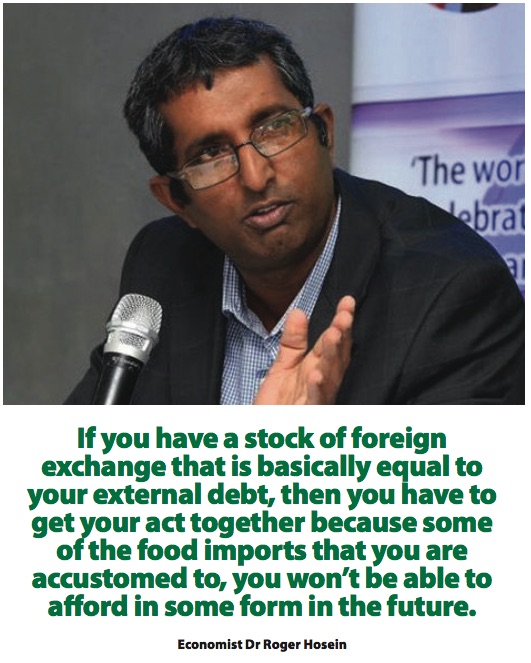UWI agriculture, economic experts call for greater action towards food sovereignty in the shadow of COVID-19 and the Russia-Ukraine conflict
It’s a known fact that Trinidad and Tobago’s food security is deeply connected to the global economic climate. But experts from UWI St Augustine are warning that Trinidad and Tobago’s food security is actually in a precarious state as the country’s food import bill continues to rise despite economic decline over the past several years.

During The UWI’s July 29 Trade and Economic Development Unit online forum on food security, economist Dr Roger Hosein called on stakeholders to produce a viable strategy to reduce the food import bill.
Dr Hosein explained, “Between 2008 and 2020, food imports increased 12 percent, GDP per capita fell 20 percent, and official reserves fell 26 percent, but retail food prices increased 165 percent.
“It’s time to get our act together... we need a detailed understanding of our food import bill and where our food comes from, so we can plan what proportion could be substituted within CARICOM.”
Frustrated by the “lip service” paid to the issue, Hosein said T&T will remain food insecure, especially as food prices continue to rise, if the issue of food sovereignty isn’t addressed.
In a food secure country, all people – at all times – have access to sufficient, safe, and nutritious food that meets their food preferences and dietary needs. What sets a food sovereign country apart is that such a country also controls the policies of food production and distribution.
With up to 80 percent of its food products imported, T&T isn’t considered food sovereign. Pointing out that the price of flour – a food staple – rose due to the disruptive effects of the Russia-Ukraine war on global wheat supply, Dr Hosein said the war is an example of how shocks to the global food supply chain affect countries that are not food sovereign. When the availability and accessibility of a food staple like flour become affected, food security is in turn affected.
Apart from a lack of food sovereignty, Hosein added, “We have a situation where our stock of foreign exchange is basically equal to our external debt.”
He explained, “If you have a stock of foreign exchange that is basically equal to your external debt, then you have to get your act together because some of the food imports that you are accustomed to, you won’t be able to afford in some form in the future.”

Former Faculty of Food and Agriculture Dean and major regional voice for food security and sovereignty Professor Wayne Ganpat said it isn’t impossible for the country to achieve food security, but it will take effort. On average, T&T spends at least $6 billion on food imports. The Russia-Ukraine war and the COVID-19 pandemic have pushed the bill higher.
Unconvinced the country has learnt much from the pandemic and war, Prof Ganpat wants to see a substantial increase in local food production.
"“We have slow local and regional efforts for our immediate needs. We have spoken about them (our food needs) since the start of the pandemic,” he said.
“We are two years into the pandemic and I am really not seeing the urgency,” Prof Ganpat pointed out. “I’m not seeing the increased production. I am not seeing the activities and the headway that we should be making in making ourselves food secure.”
While Prof Ganpat commended recent national initiatives like the Ministry of Youth Development’s Youth Agricultural Homestead Programme, and the national home gardening campaign, he wants more to be done.
For now, he thinks T&T setting a goal of producing at least 50 percent of its food products is achievable.
“We will never be able to fill that plate [of producing all food locally], but we have to have the majority, or a greater part of that plate, locally produced,” he said. “When I say locally, maybe regionally as well but not from the outside... not extra-regionally, not from the food provided to us by the importers.... They should not be able to dictate what’s on our plate.”
Even though he recognises the barriers to greater agricultural productivity – like the availability of arable land for large-scale agriculture – Dr Hosein said it is still not an excuse for not ramping up production.
With farming methods like vertical farming optimising spaces, Dr Hosein said, “We don’t have land in a big way but whatever land we have, we have to use it wisely [along with] greenhouses and shade houses. These are intensive systems that could produce a lot more vegetables on a given portion of land than if you did it traditionally.”
Managing Director of Kent Farms Limited, Mr Kent Vieira, said his company has made strides in modernising its production systems to maximise outputs and revamp its products to attract local consumers.
Though a demand for local seafood exists, Vieira noted that efforts should be made to refine products.
He recalled, “Last year, we were able to supply PriceSmart... they were able to refine our packaging and presentation. We sold whole fish in PriceSmart - something people often want filleted. The whole fish did extremely well for the [2021] Lenten period and it was all down to how it was marketed and presented.”
Already offering a variety of fish products, including fillets and fish balls, Vieira teased his farm is researching the feasibility of farming a new fish species to make fish fingers.
Looking forward, Vieira added, “Most of our equipment is electrical, so it lends well for us to be able to use solar power at the farm and move towards that green opportunity.”